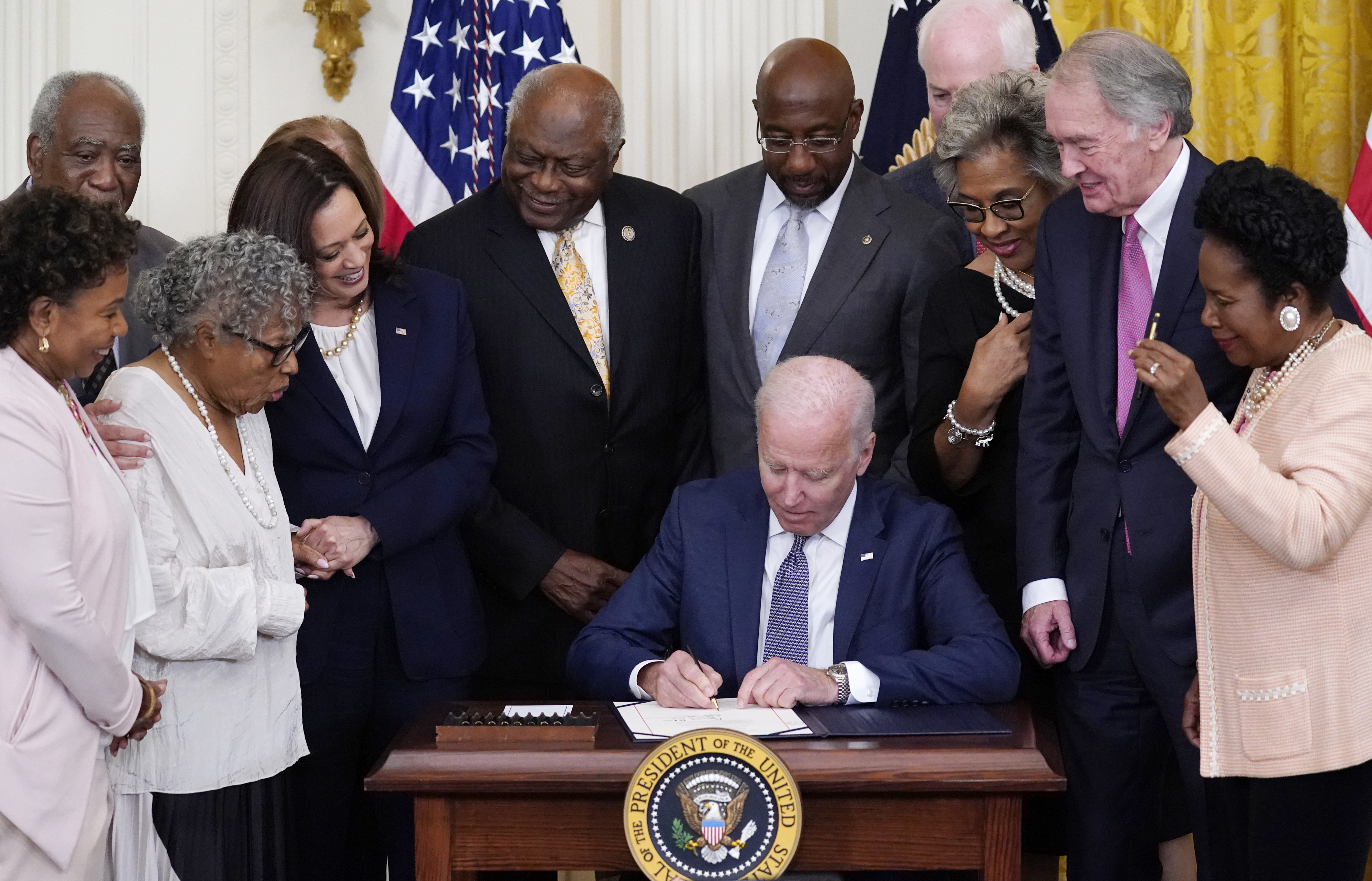Juneteenth became a federal holiday to commemorate the emancipation of enslaved African Americans in the United States. Juneteenth, also known as Freedom Day or Emancipation Day, is a significant holiday in the United States that commemorates the emancipation of enslaved African Americans.
On June 19, 1865, Union soldiers arrived in Galveston, Texas, and announced the end of slavery, two and a half years after the Emancipation Proclamation was issued. The holiday celebrates the freedom and resilience of African Americans and serves as a reminder of the ongoing struggle for equality and justice.
In 2021, Juneteenth was officially recognized as a federal holiday, marking a historic milestone in acknowledging the importance of this date in American history. This article explores the significance of Juneteenth and its evolution into a federal holiday.
History Of Juneteenth
Juneteenth Federal Holiday commemorates the emancipation of enslaved African Americans in the United States. Understanding the history of Juneteenth is essential to grasp the significance of this momentous day. The origins of Juneteenth and the significance of June 19th are deeply intertwined with the struggle for freedom and equality.
Origins Of Juneteenth
The origins of Juneteenth can be traced back to June 19, 1865, when Union soldiers, led by Major General Gordon Granger, arrived in Galveston, Texas, with news that the Civil War had ended and that all enslaved individuals were now free. This announcement, made more than two years after the Emancipation Proclamation was issued, marked a pivotal moment in American history. The newly freed individuals celebrated their emancipation with prayer, feasting, and reflection, laying the foundation for the annual Juneteenth celebrations that continue to this day.
The observance of Juneteenth spread across the United States, becoming a symbol of resilience and hope for African American communities. It served as a reminder of the long and arduous journey towards freedom and equality, while also celebrating the achievements and contributions of African Americans to the nation.
Significance Of June 19th
June 19th holds immense significance as the day when the last enslaved individuals in the United States were finally informed of their freedom. It stands as a testament to the enduring struggle for equality and justice, highlighting the resilience and determination of the African American community in the face of adversity.
Juneteenth represents not only a celebration of freedom but also a call to action, reminding us of the ongoing pursuit of civil rights and the need to address systemic inequalities. It serves as a day of reflection, education, and unity, fostering a deeper understanding of the nation's history and the continued fight for racial equality.
Recognition And Celebrations
Juneteenth Federal Holiday is a significant day in American history that commemorates the emancipation of enslaved African Americans. It is a time to recognize the struggles and achievements of Black Americans, as well as celebrate their freedom and cultural contributions. In this blog post, we will explore the early recognition of Juneteenth and the evolution of Juneteenth celebrations.
Early Recognition Of Juneteenth
Juneteenth traces its roots back to June 19, 1865, when Union soldiers arrived in Galveston, Texas, and announced the end of slavery, more than two years after the Emancipation Proclamation was issued by President Abraham Lincoln. This day marked a pivotal moment in American history, as it symbolized the liberation of enslaved African Americans.
Over the years, Juneteenth gained recognition among African American communities across the country. It became an occasion to gather, reflect on the past, and celebrate the progress made towards racial equality. Churches, community organizations, and individuals played a crucial role in keeping the Juneteenth tradition alive.
Here are a few key points about the early recognition of Juneteenth:
Juneteenth celebrations initially began in Texas and spread to other states.
It was celebrated through various activities such as parades, picnics, and religious ceremonies.
The red color, often seen during Juneteenth celebrations, symbolizes resilience and perseverance.
Evolution Of Juneteenth Celebrations
As the years went by, Juneteenth celebrations evolved and gained wider recognition. The Civil Rights Movement of the 1960s played a significant role in bringing attention to the holiday and its historical significance. Activists and community leaders highlighted the importance of Juneteenth as a reminder of the ongoing fight for racial justice and equality.
In recent years, Juneteenth has gained even more visibility and support. In 2021, Juneteenth was officially recognized as a federal holiday, signifying a monumental step towards acknowledging the impact of slavery and honoring the resilience of African Americans. This federal recognition has sparked a renewed interest in Juneteenth celebrations across the nation.
Here are a few notable aspects of the evolution of Juneteenth celebrations:
Juneteenth is now celebrated in all 50 states and recognized as a state holiday in several states.
There has been an increased focus on education and awareness about Juneteenth in schools and communities.
Juneteenth celebrations often include cultural performances, historical reenactments, and discussions on racial equity.
Call For National Recognition
Juneteenth is a significant day that marks the end of slavery in the United States, and it has been celebrated by African Americans for over a century. However, it wasn't until 2021 that Juneteenth was recognized as a federal holiday, making it the first new federal holiday in nearly 40 years. While this recognition is a step towards acknowledging the impact of slavery on the Black community, many have called for national recognition of Juneteenth as a day of remembrance and celebration. In this article, we will discuss the efforts to make Juneteenth a federal holiday and the congressional actions taken to ensure its recognition.
Efforts To Make Juneteenth A Federal Holiday
The push for Juneteenth to become a federal holiday began in the 1980s, but it wasn't until the Black Lives Matter protests of 2020 that the movement gained momentum. Many corporations and organizations recognized Juneteenth as a paid holiday, and several states declared it a state holiday. However, it wasn't until June 17, 2021, that President Joe Biden signed the Juneteenth National Independence Day Act into law, officially making Juneteenth a federal holiday.
Efforts to make Juneteenth a federal holiday were largely driven by the African American community and its allies. The movement gained traction in the wake of the murder of George Floyd and the subsequent protests, which brought issues of systemic racism and police brutality to the forefront of national conversations. The recognition of Juneteenth as a federal holiday is seen as a symbolic gesture towards acknowledging the impact of slavery on African Americans and the ongoing struggle for racial justice.
Congressional Actions
The road to making Juneteenth a federal holiday was not without its challenges. While the bill passed unanimously in the Senate, it faced opposition in the House of Representatives. Some lawmakers raised concerns about the cost of a new federal holiday, while others argued that Juneteenth should not be recognized as a holiday because it is not a "federal event." However, the bill ultimately passed with overwhelming support, with 14 Republicans voting against it.
Since the passage of the Juneteenth National Independence Day Act, there have been calls to make Juneteenth a paid holiday for federal employees. While President Biden signed an executive order granting federal employees the day off on June 18, 2021, some lawmakers have proposed legislation that would make Juneteenth a permanent paid federal holiday.
Overall, the recognition of Juneteenth as a federal holiday is a significant step towards acknowledging the history and ongoing impact of slavery in the United States. While there is still work to be done to address issues of systemic racism and inequality, the recognition of Juneteenth is an important symbol of progress towards a more just and equitable society.

Credit: www.federaltimes.com
Juneteenth Act
Juneteenth, also known as Juneteenth National Independence Day, commemorates the end of slavery in the United States. The Juneteenth National Independence Day Act was signed into law on June 17, 2021, establishing Juneteenth as a federal holiday. This historical milestone signifies the recognition of the significance of Juneteenth in American history and culture.
Passage Of The Juneteenth National Independence Day Act
The passage of the Juneteenth National Independence Day Act marks a pivotal moment in U.S. history. The Act was passed with overwhelming bipartisan support, underscoring the widespread acknowledgment of the importance of commemorating the end of slavery. This legislation not only designates June 19th as a federal holiday but also signifies a significant step towards acknowledging the impact of slavery on the nation's history and the ongoing pursuit of equality.
Implications And Symbolism
The establishment of Juneteenth as a federal holiday carries profound implications and symbolism. It serves as a powerful symbol of freedom and liberation for African Americans and all individuals who value equality and justice. By recognizing Juneteenth as a federal holiday, the government acknowledges the historical injustices of slavery and reaffirms its commitment to promoting unity and understanding among all citizens.
Public Response
Juneteenth, also known as Freedom Day or Emancipation Day, is an important day in American history that commemorates the emancipation of enslaved African Americans. On June 19, 1865, Union soldiers arrived in Galveston, Texas, and announced the end of slavery, more than two years after the Emancipation Proclamation was signed. The significance of this day has been recognized by many, leading to the recent declaration of Juneteenth as a federal holiday. This decision has elicited a wide range of responses from the public, with both support and opposition being voiced.
Support And Opposition To Juneteenth As A Federal Holiday
The designation of Juneteenth as a federal holiday has garnered significant support from various individuals and organizations across the country. Many believe that this recognition is long overdue and represents an essential step towards acknowledging and confronting the dark history of slavery in the United States. Supporters argue that making Juneteenth a federal holiday serves as a powerful symbol of progress and equality, allowing for national reflection and education on the importance of racial justice.
On the other hand, there are those who express opposition to the establishment of Juneteenth as a federal holiday. Some critics argue that the creation of another federal holiday is unnecessary and could potentially dilute the significance of existing holidays. Concerns have also been raised about the potential financial implications of adding another paid day off for federal employees. However, it is important to note that while opposition exists, it is relatively minimal compared to the overwhelming support for this historic day to be recognized nationally.
Public Celebrations And Commemorations
The declaration of Juneteenth as a federal holiday has sparked widespread public celebrations and commemorations throughout the nation. Communities across the country organize various events and activities to mark this significant day in American history. Parades, festivals, concerts, and educational programs are just a few examples of the ways in which people come together to honor the emancipation of enslaved African Americans.
Public commemorations often include speeches, historical reenactments, and art displays that highlight the struggles and achievements of those who fought for freedom and equality. These events serve as opportunities for individuals of all backgrounds to learn, reflect, and engage in conversations about the legacy of slavery and its ongoing impact on society.
Furthermore, public celebrations of Juneteenth provide a platform for African American communities to embrace and showcase their culture, traditions, and achievements. This holiday serves as a reminder of the resilience and strength of the African American community throughout history, and an opportunity to promote unity and understanding among diverse groups.

Credit: nul.org
Impact And Significance
Juneteenth Federal Holiday holds immense significance and impact in recognizing and commemorating the end of slavery in the United States. It serves as a pivotal moment in American history, marking the emancipation of enslaved African Americans and celebrating their enduring resilience. Understanding the impact and significance of Juneteenth allows for a deeper appreciation of the struggles and triumphs of the African American community.
Recognition Of African American History
Juneteenth symbolizes the recognition of African American history and the enduring legacy of their resilience. It provides a platform to acknowledge the contributions and sacrifices of African Americans throughout history. The holiday serves as a reminder of the struggles and triumphs of the past, honoring the resilience and strength of the African American community.
Reflection And Education
Juneteenth encourages reflection on the dark chapters of American history while promoting education and awareness about the impact of slavery. It provides an opportunity to engage in meaningful conversations about the legacy of slavery and its ongoing effects, fostering a deeper understanding of the African American experience. Through educational initiatives and discussions, Juneteenth promotes empathy, understanding, and unity.
Cultural And Economic Impact
Juneteenth holds significant cultural and economic impact as it fosters a sense of community and unity. The holiday provides a platform for celebrating African American culture, showcasing art, music, and traditions that have enriched American society. Additionally, Juneteenth celebrations stimulate economic activity, supporting local businesses and promoting cultural exchange. The commemoration of Juneteenth contributes to the cultural vibrancy and economic vitality of communities across the nation.
Continued Advocacy
Continued Advocacy for Juneteenth Federal Holiday involves ongoing efforts to promote racial equality and social justice. It is a time to reflect on the progress made and the work that still needs to be done to ensure equality for all individuals.
Ongoing Efforts For Racial Equality
The ongoing advocacy for racial equality in the context of Juneteenth is crucial for creating a more inclusive society.
Advocacy for policy changes that address systemic racism
Supporting organizations that promote diversity and inclusion
Educating communities on the importance of equality and equity
Key Points | Actions |
|---|---|
Legislation | Supporting bills that promote equality in all aspects of life |
Education | Providing resources to educate individuals on the history of racial inequality |
Juneteenth As A Catalyst For Change
Juneteenth serves as a catalyst for change by highlighting the importance of freedom, equality, and justice for all.
Reflection on the history of slavery and its impact on society
Unity in the fight against racism and discrimination
Celebration of progress while acknowledging the work ahead
Global Observance
Juneteenth Federal Holiday is not just a day of significance within the United States but has gained global observance over the years. Countries around the world are recognizing the historical importance of Juneteenth and its impact on the fight for freedom and equality.
International Recognition Of Juneteenth
Juneteenth's significance has transcended borders, with several countries acknowledging and commemorating the day in various ways:
Canada, Mexico, and the United Kingdom have started observing Juneteenth through educational programs and cultural events.
Germany has highlighted Juneteenth as a day to reflect on the history of slavery and racism.
Several African countries have shown solidarity with Juneteenth celebrations to honor the resilience of enslaved Africans.
Juneteenth's global recognition underscores its universal message of freedom, justice, and equality.
Inspiration For Similar Observances
The global observance of Juneteenth has inspired similar commemorations in various countries, leading to the establishment of new holidays and events:
France has initiated discussions on creating a day to recognize the abolition of slavery.
Brazil has seen movements advocating for the recognition of Emancipation Day, drawing inspiration from Juneteenth.
Australia has witnessed growing support for acknowledging the impact of colonization on Indigenous communities, mirroring the themes of Juneteenth.
Juneteenth's influence has sparked conversations worldwide about the legacy of slavery and the ongoing struggle for racial equality.

Credit: www.theeap.com
Frequently Asked Questions
What Is Juneteenth And Its Significance?
Juneteenth commemorates the emancipation of enslaved African Americans in the United States. It signifies freedom, equality, and celebrates the end of slavery in America on June 19, 1865.
Why Is Juneteenth Now A Federal Holiday?
Juneteenth became a federal holiday to officially recognize and honor the historical significance of the end of slavery in the United States. It aims to promote awareness, education, and unity among all Americans.
How Is Juneteenth Celebrated Nationwide?
Juneteenth is celebrated through various events, including parades, festivals, concerts, picnics, educational programs, and community gatherings. People engage in activities that promote African American culture, history, and unity within their communities.
What Impact Does Juneteenth Have On Society?
Juneteenth serves as a reminder of the struggles and achievements of African Americans in their fight for freedom and equality. It promotes unity, understanding, and dialogue on racial issues, fostering a more inclusive and diverse society.
Conclusion
Juneteenth is a momentous occasion for the African American community, marking the end of slavery in the United States. The recognition of Juneteenth as a federal holiday is a step towards acknowledging the country's dark past and moving towards a more inclusive future.
It is important to celebrate and honor this day, not just as a historical event, but as a reminder of the ongoing fight for racial equality. Let us use this day to educate ourselves, uplift black voices, and continue the fight for justice and equality.
